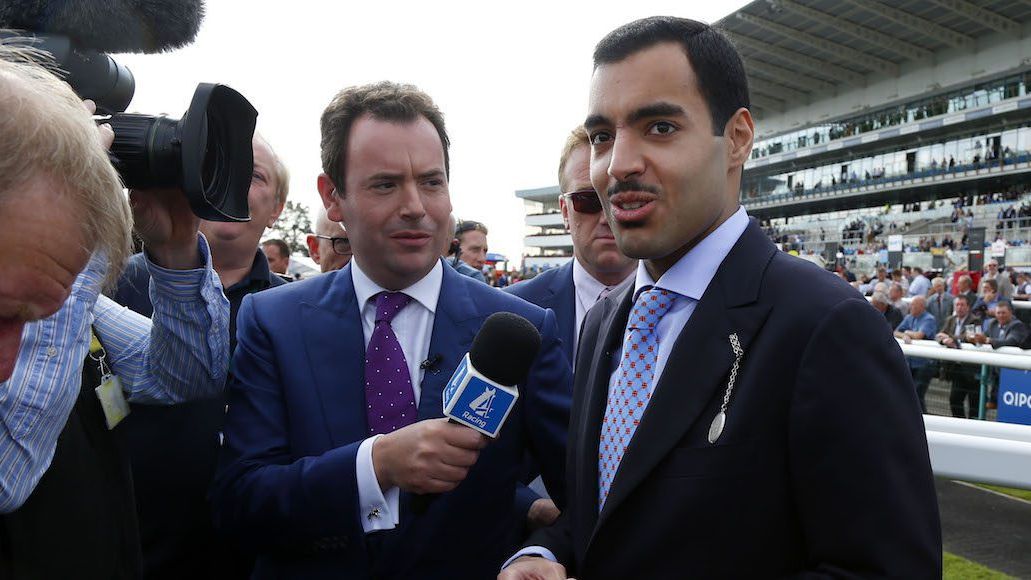

Words: Harry Jarman
In six short years Qatari Sheikh Fahad bin Abdullah Al-Thani has become one of the major power players in British horse racing.
Yet, remarkably, the director of QIPCO Holding (Qatar Investments & Projects Development Holding), one of the world’s leading private investment companies, is three years off his 30th birthday.
His spring-heeled charge has seen him turn an impressive 30% strike rate with just 10 horses in 2010 into a reported 250 horses
His spring-heeled charge has seen him turn an impressive 30% strike rate with just 10 horses in 2010 into a reported 250 horses, training across seven different countries. Sheikh Fahad now oversees the running of Qatar Racing and Qatar Bloodstock, both subsidiaries of QIPCO Holding, along with Pearl Bloodstock. Harry Jarman is granted an audience with British horse racing’s “new super power”.
Lunch takes place at the acclaimed 34 in Mayfair, a Group One sprint from Sheikh Fahad’s Park Lane family home. Bought in 2014, 44,000 square feet has been painstakingly restored to its former glory by his eldest brother, Sheikh Hamad. It reportedly houses 17 bedrooms and an 81foot picture gallery, holding an unsurprisingly impressive collection. Queen Elizabeth, on a recent visit, reportedly remarked: “this place makes Buckingham Palace look rather dull.” Sheikh Fahad is first cousin to the Emir of the state of Qatar, while his father Sheikh Abdullah bin Khalifa Al Thani was prime minister between 1996 and 2007. His older bother, Sheikh Hamad, has become one of London’s most invited. He also has gained a reputation as one of the most astute art collectors of his generation.
However, for Sheikh Fahad, horse racing has become his passion
However, for Sheikh Fahad, horse racing has become his passion. QIPCO holds the attention of the business world after rising to prominence through several shrewd investments. It has been reported to be worth over $5 billion. But many now recognise QIPCO from the racetrack.
In 2014, by the special royal permission, QIPCO became the first commercial partner of Royal Ascot.
Lunch was a unique opportunity to uncover the strategy of major investment in horse racing’s future. Critics claim the Arab grab for stakes in British racing is simply a show of power, with each Sheikh trying to out do another. Yet various individuals who know Sheikh Fahad, are assured that this wasn’t the case. Having only watched his first horse race on TV in 2008, and first live race in the beginning of 2010, he started buying horses in April of that year. Since then he has even made his debut in the saddle in Ireland and at Ascot and Newmarket. He cannot hide his delight. “I saw a British horse race when I was studying in London,” he recalls. “Rather than a flat race, it was a jumps race on Channel 4 Racing. After it I was hooked and continued to tune in every Saturday.” His father is a leading Arab race horse owner in Qatar and France. Yet Sheikh Fahad is in thrall of British thoroughbreds. After studying London’s financial markets, and living by the mantra that time spent on reconnaissance is seldom wasted, he meticulously examined horse sales. He appointed David Reeves as his racing manager after making a correlation between money spent and race results. “All the information is there,” he tells me, wisely. Similar to the astute reading of the financial markets, he concluded that Reeves had the best statistics pound for pound when buying horse at £40,000 to £50,000. He bought his first 10 horses. Instead of buying yearlings in the October sales, he listened to Reeves and bought in spring’s breeze up sales, figuring out it was a better to see the horses run and judge the quality. He had the racing world’s attention.
A year later, with his father sponsoring the Arc de Triomphe in Paris, Sheikh Fahad was determined to find a competitive runner. Richard Gibson, an English trainer based in France, said he had found a horse that could win the prestigious handicap. Sheikh Fahad instucted that at the right price he would buy. In hindsight, it was one of his shrewdest investments. The only issue was that the horse was owned by his father’s Arab trainer. Determined to keep his identity hidden from the seller, Sheikh Fahad kept his identity hidden. The horse was called Dunaden. Going into the straight on Arc day, he was last but recovered to finish second by a nose. The Sheikh then set his sights on the Melbourne Cup. Dunaden, as those in racing know, romped home to take Australia’s biggest race.
There’s no doubt that the Qatari’s are a forced to be reckoned with, both on and off the race track. Horse Racing after all is the second most watch sport in Britain and has a total economic impact of £3.45bn. Families such as the Al-Thani’s ensure that the sport of kings continues to thrive.


